Marketing automation software helps grow your business and improve customer experience. This list details the top marketing automation platforms around to help you decide which one is right for you.
Without a marketing strategy in place, you’ll find it difficult to reach new customers and build brand visibility. But where do you even start?
Marketing brings together so many different elements that it’s hard to know where to begin. This is where marketing automation services can help. These platforms automate marketing tasks so you can drive sales and build deeper customer relationships.
And it’s not just about email marketing automation. There’s so much more to streamline, from sending automated SMS reminders to sorting your contact lists.
To help you compare the different solutions, we’ve picked out the best marketing automation tools available along with the features that set them apart.
The top marketing automation software at a glance
What does marketing automation software do?
If you’re here, you know what marketing automation is. In sum: marketing automation software helps businesses to streamline marketing processes, create automated workflows, and avoid repetitive tasks in digital marketing.
It's no secret that marketing automation software is a game-changer for many companies. That's why 76% of businesses report they use business automation tools.
Here is a a brief overview of the use cases where marketing automation software drives the most significant benefits for marketing teams.
Personalized customer journeys
Marketing automation helps you capture key information, such as contact details or purchase history. This allows you to send targeted marketing campaigns.
It’s impossible to create highly personalized customer journeys without using automation. You can’t know each customer by name or remember which products they prefer—but having a marketing automation platform makes it easier.
Effortless lead capture
Automatically store key lead data for future campaigns. Users usually provide this data via a signup form embedded on your site, landing pages, emails, or chat widgets. Marketing automation software then records the data and sends it to a customer relationship management system (CRM).
Note: you may be wondering whether a marketing automation tool is the same as a CRM. The answer is no. They have different functions but can be integrated to move leads along the purchase funnel.
Read more about combining your CRM and automation tool.
Customer relationship management
Marketing automation helps you send perfectly timed messages across important touch points. That's because most touch points for retention and customer support can be automated. The consolidated customer data then helps you manage the customer lifecycle efficiently.
Here are a few examples of automated relationship management:
- Attract potential customers with targeted, personalized campaigns
- Send a welcome email to start a lead nurturing process with each new lead
- Trigger a special offer email when the customer reaches VIP status
- Re-engage idle customers
- Ask for feedback after an order
- Reconnect with old customers to offer maintenance services for products they bought before
Discover more marketing automation workflow examples here to boost your customer engagement.
Automated email sequences
Email automation is a way to scale for large and small businesses alike. It lets you reach each customer with the right message at the right time for maximum impact without actually doing anything manually.
Your marketing automation software will keep track of user behavior and trigger emails with relevant content or offers. That’s also known as drip marketing. One of the best uses of it is for abandoned cart emails.
Popular marketing automation software features
To be able to automate your marketing as described above, look for the following features:
- Trigger emails (e.g. birthday emails)
- Multichannel flows possible (combining SMS, email, WhatsApp, push notifications, etc.)
- Automated contact management
- Lead scoring
- Drip campaigns (e.g. abandoned cart sequences)
- Dynamic personalization
Best marketing automation services compared
Now, let’s take a look at the top marketing automation tools on the market and what they can do for your business.
1. Brevo
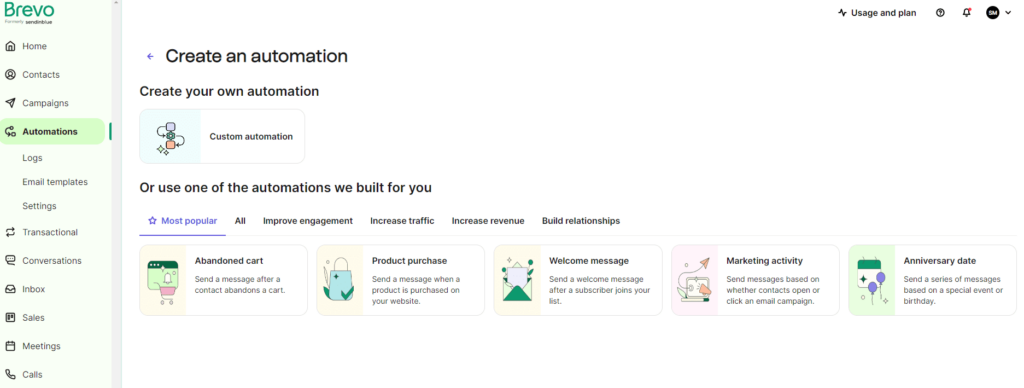
Brevo is the best marketing automation software for growing businesses.
It supports every stage of the customer journey, from lead qualification to nurturing and post-sale support. Track visitor behavior on your site and create automated workflows for engagement, contact management, and task optimization.
Brevo’s workflow builder is visual, making it easy and intuitive to create automation sequences as complex as your business needs.
Here are the features offered in Brevo’s automation toolkit:
- Lead capture & lead scoring
- Automated emails
- Email personalization & dynamic content
- Custom triggers (any tracked event can be used as a trigger)
- Autoresponders
- Ready-made scenarios to use as templates (welcome emails, birthday emails)
- Complex multichannel automation workflows including email, SMS, WhatsApp messages, push notifications, and live chat/chatbots)
- Visual flow builder with branches (if/then rules)
- Beautiful ready-to-use email templates
- Contact management
- Audience segmentation & ready segments to save you time
- Website tracking
- A/B testing
- Chatbot scenarios
- Integrated Sales Platform
- API and multiple integrations available
Brevo lets you set up scenarios and marketing workflows to handle most customer interactions automatically. You choose what happens after any customer action. The integrated contact database feeds personalization data and the automation can send emails, manage contacts, trigger notifications, and more on your behalf.
And the best part is Brevo's ease of use. You don’t need any technical skills to create marketing automation workflows with Brevo. The if/else conditions allow you to design any scenario without coding.
shares Jean-Baptiste Bouvier, Co-founder and CMO at Monisnap.
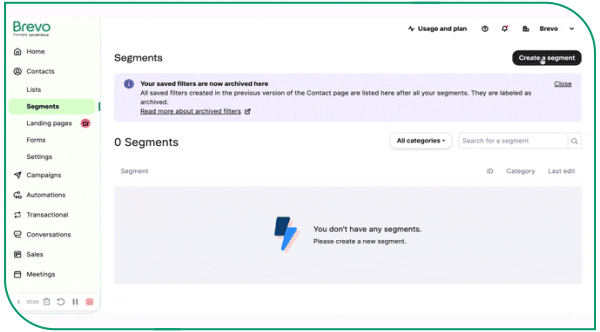
Segments ready to use in your email marketing campaigns to save you time
Ecommerce, SaaS, offline, and service-based businesses can all do more with less, using Brevo. Whether you’re a solopreneur or have a sales team, Brevo’s marketing automation software helps you scale your marketing efforts and build win-win relationships.
Use cases include but aren't limited to:
- Nurturing leads with welcome messages, drip campaigns, and action-based touchpoints
- Post-purchase engagement including asking for feedback and following-up based on the response
- Onboarding users
- Upselling, cross-selling and recovering abandoned carts
- Lead scoring and automated audience segmentation
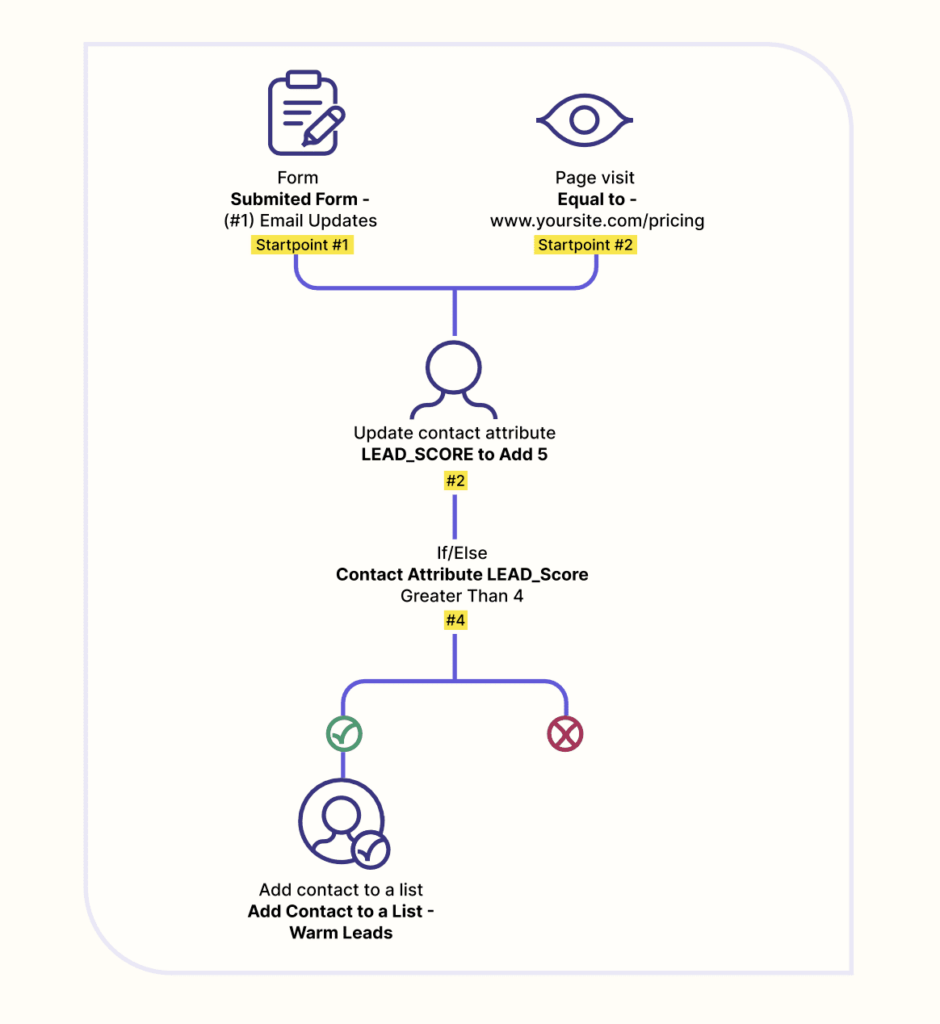
Lead scoring model done with Brevo's marketing automation software
Brevo pricing
In Brevo’s free forever plan, you can send up to 300 automated emails per day to up to 2,000 contacts.
Paid plans start at $9/month and include 5,000 emails per month. You can customize your plan with add-ons such as more email credits, WhatsApp and SMS credits, and dedicated IP. You never have to pay for features you don’t need.
Unlimited marketing automation starts at $65/month. When you choose a plan, the costs will depend on how many emails you expect to send every month.
2. HubSpot
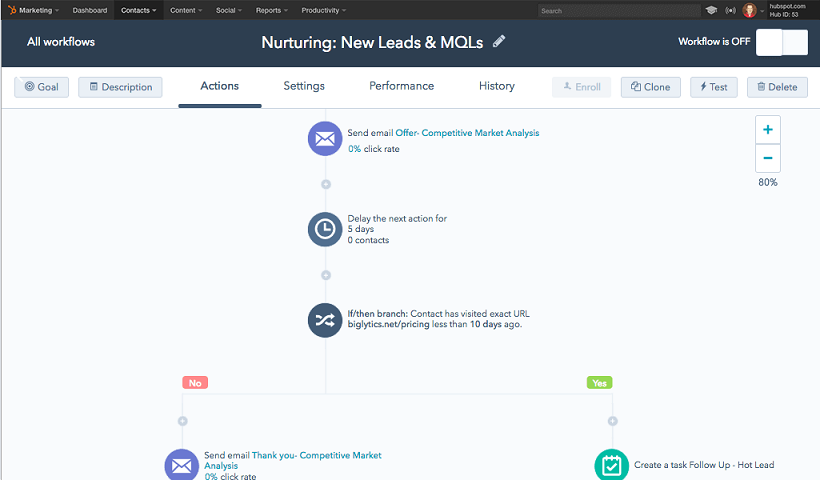
HubSpot is a famous all-in-one marketing automation platform streamlining key processes in sales, operations, and user engagement.
Similar to others on this list, HubSpot offers no-code tools for building automation workflows. Pre-defined triggers, conditions, and actions are ready to use and you can also build custom automations.
Price
HubSpot's Marketing Hub plan starts at $20/month. At this price, you can store up to 1,000 contacts, set up lead generation campaigns, and basic email automations. To access omnichannel marketing automation features, dynamic personalization, and contact scoring, you’ll need to upgrade to the Professional plan, starting at $890/month for 1,000 contacts.
For more information on HubSpot’s offer check out our detailed comparison of HubSpot and competitors.
3. Pardot (Salesforce)
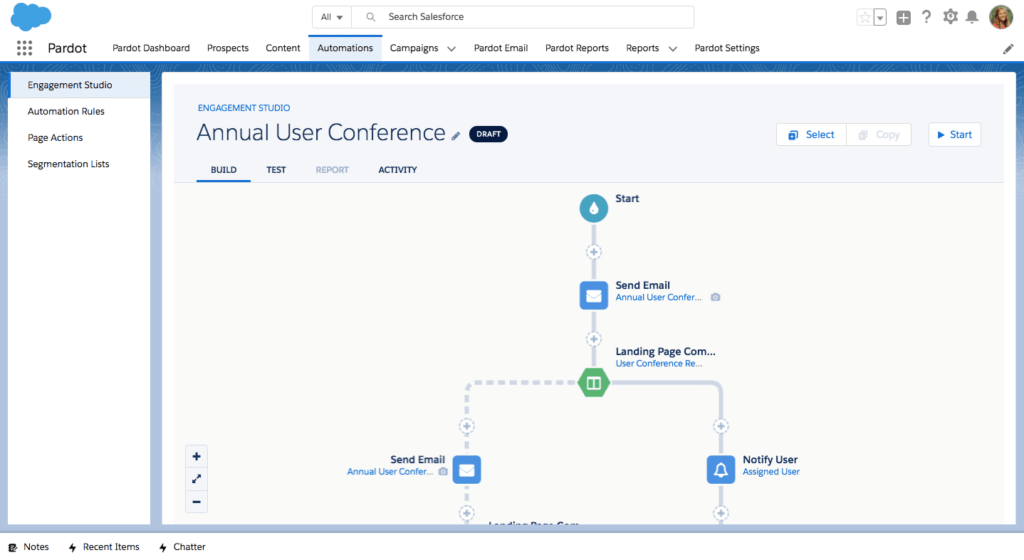
Pardot is the old name of the Salesforce’s marketing automation service, now called Account Engagement. Primarily aimed at B2B marketers, it streamlines the sales process of complex organizations.
Features include a landing page builder and smart forms for lead generation, as well as email marketing capabilities that let you segment subscribers and create automated, trigger-based campaigns.
As with all Salesforce products, it can be connected to the rest of the ecosystem, with some limits of data usage between tools.
Price
Pardot is predominantly for enterprise-level businesses and the pricing packages reflect this. The cheapest plan with basic features starts at $1,250 per month for up to 10,000 contacts.
For more information, check out other Salesforce alternatives.
4. Marketo (by Adobe)
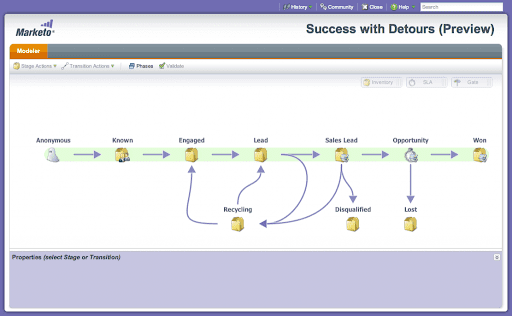
Adobe Marketo Engage is a complete toolkit for both B2B and B2C marketers. It’s a sophisticated marketing automation solution for mid-sized businesses and enterprises.
Marketo Engage helps you to accelerate the customer experience through:
- Behavior tracking
- Multichannel marketing
- In-depth reporting
- Lead management
- Automated lead nurturing
- Audience segmentation
- Customer relationship management
Users highlight Marketo’s complexity, more suited for big companies, and its steep price.
Price
Marketo doesn’t display pricing publicly, you need to contact sales to get a quote. However, it’s good to know that prices are based on database size and start at $895 a month. There’s only a free trial, no free plan available.
5. Eloqua (by Oracle)
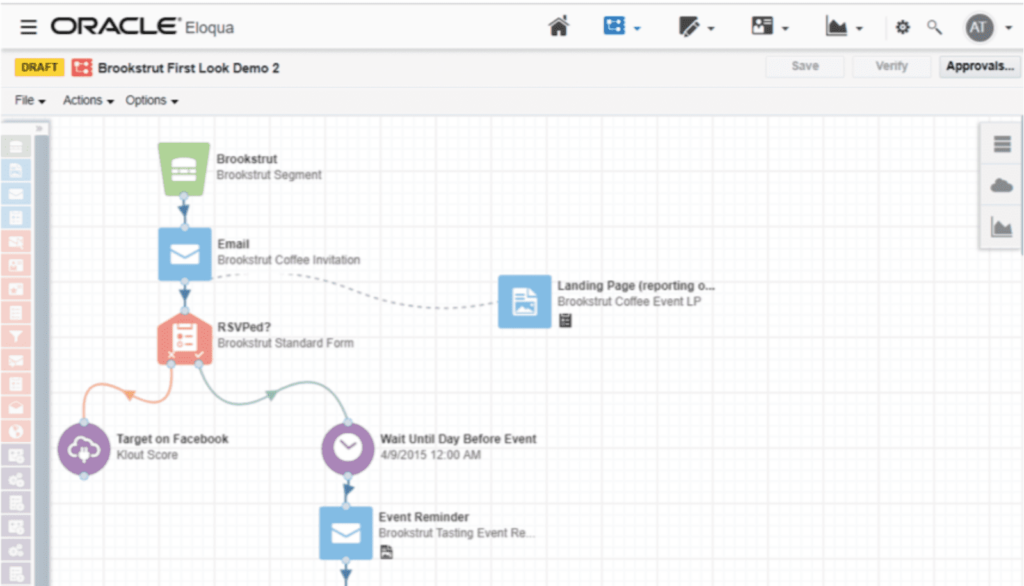
Oracle Eloqua Marketing Automation is a B2B marketing automation solution for mid-sized and enterprise-level companies.
Its features include:
- Adaptive campaign management
- Audience segmentation
- Data-driven targeting
- Automated retargeting
- Lead scoring
- Dynamic content for emails and landing pages
- Progressive profiling forms
Oracle Eloqua helps B2B marketers create and manage cross-channel B2B marketing campaigns and nurture leads across each stage of the customer journey. Advanced tools for campaign design, lead scoring, and inbound marketing analytics make automation workflows of any complexity possible.
If you’re looking for advanced automations and robust API capabilities, Oracle Eloqua is a good choice.
On the downside, Oracle Eloqua isn’t priced to be accessible. You should also be ready to sign a long-term contract with the company.
Price
Oracle Eloqua pricing is only available on request. However, you should be warned it starts at $2,000 a month for 10,000 contacts.
6. Keap
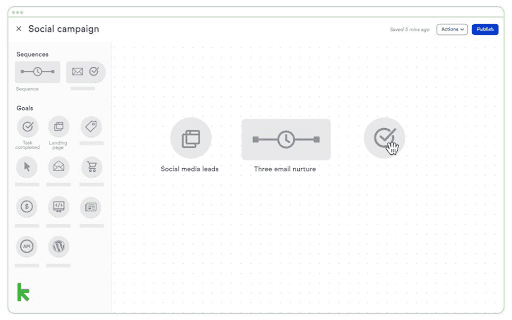
Keap, formerly Infusionsoft, offers marketing automation software for digital business, sales, and CRM. With Keap, you get:
- Automated lead capture and follow-ups
- Email campaigns
- Automated sales nurture
- CRM automation
Keap’s Advanced Automations builder allows for creating advanced nurture sequences, multi-step workflow automations, personalization response triggers, and more. You can also capture lead information like user behavior or preferences and then set up highly personalized automated workflows.
Keap connects to over 4,000 apps. You can easily integrate the platform into your existing ecosystem without writing a single line of code.
Price
Keap starts at $159/month for up to 1,500 contacts. On this plan, you access all features except for promo codes and real-time marketing analytics. To get these features, you’ll need to upgrade to the Max plan starting at $229/month.
7. Klaviyo
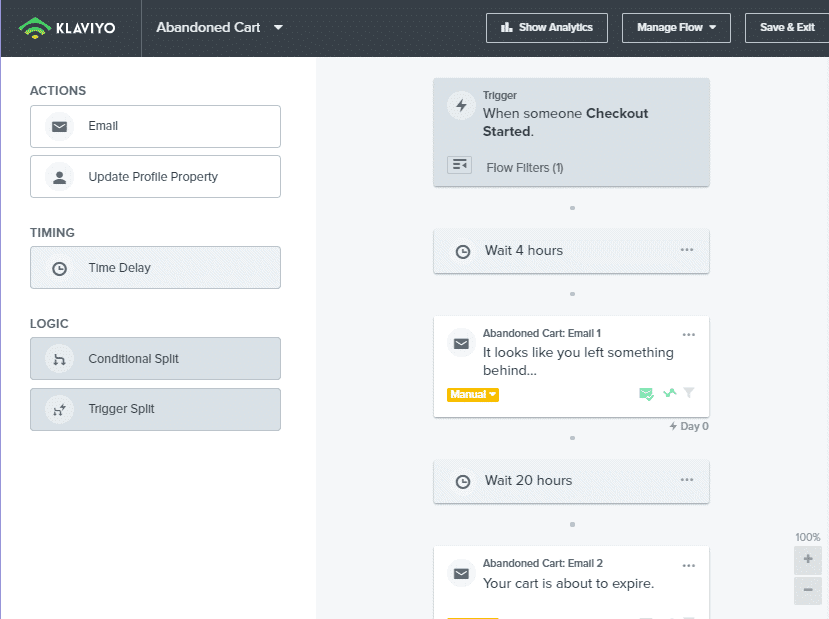
Klaviyo is a tool created for ecommerce brands that want to up engagement levels and enhance the customer experience. It predominantly combines email and SMS marketing services in an effort to build loyal relationships. It could work as a marketing automation platform.
The service integrates with major ecommerce apps as well as Facebook advertisements. There are also prebuilt signup forms to help you grow your email lists and collect customer information for personalization.
To help you decide whether Klaviyo is right for your business, check out our comparison of Klaviyo alternatives.
Price
There is a free plan for up to 500 monthly emails and 250 contacts. After that, prices start at $20 per month.
8. Act-On
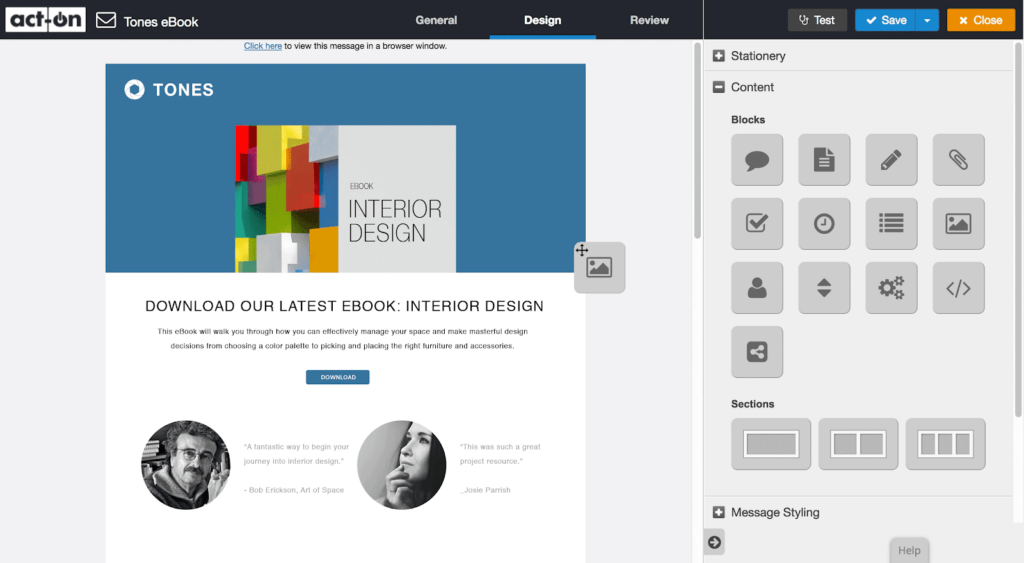
Act-On is a marketing automation software that helps businesses attract new leads and turn them into customers. The service offers a range of features for automating each step of the marketing process and provides detailed analytics.
Key features include premade web and landing pages set up for conversions and smart forms for organizing and tracking leads, while automated lead scoring helps you identify the most qualified leads and tailor your messaging.
There are also a number of powerful email marketing capabilities like segmentation, automated sequences, and a visual editor to help you keep messaging and information on brand while building connections with your customers.
Price
Like Pardot, Act-On is predominantly geared towards enterprise-level, with the cheapest package starting at $900 per month for up to 2,500 contacts.
9. ActiveCampaign
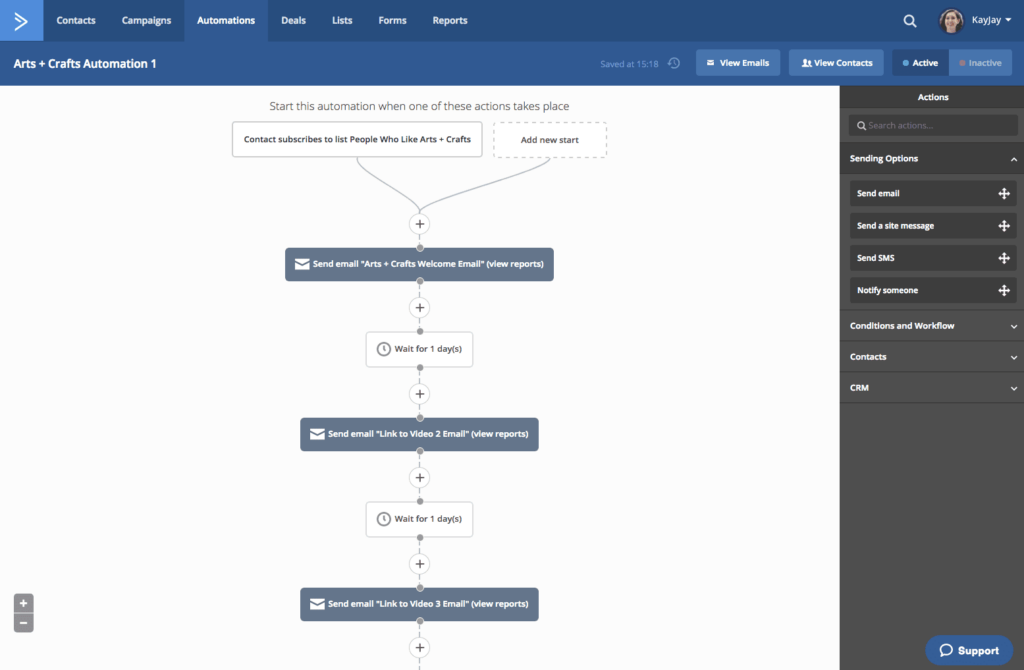
ActiveCampaign is a marketing automation software for small-to-mid-sized businesses, combining tools for email marketing, marketing and sales automation, and CRM. With ActiveCampaign’s drag-and-drop builder and customizable templates, you can create basic and custom automation workflows in minutes.
As a marketing automation platform, ActiveCampaign offers a standard set of features:
- Signup forms
- Automated email sequences
- Dynamic content
- Event tracking
- Contact management
- Lead scoring
- Segmentation
- A/B testing
- Tagging
- Attribution
The software also offers an exclusive feature, Automation Map. This is a tool that lets marketers see how their automations connect to each other. With it, you can easily trace all your workflows, update existing automations, and create new ones.
Users tend to complain about ActiveCampaign’s interface and a steep learning curve. So it may not be a go-to option for teams that are only getting started with business automation. But if you already have some experience and are ready to invest a bit of time on implementation, then it’ll eventually pay off.
For more details of ActiveCampaign’s features and pricing, take a look at our comparison of ActiveCampaign alternatives.
Price
ActiveCampaign has a contact-based pricing model. Prices start at $29/month for 1,000 contacts. On the cheapest plan, you get access to basic marketing automation features, segmentation, lead capture forms, and customer analytics. There’s no free plan, but you can try it for free for 14 days.
10. Omnisend
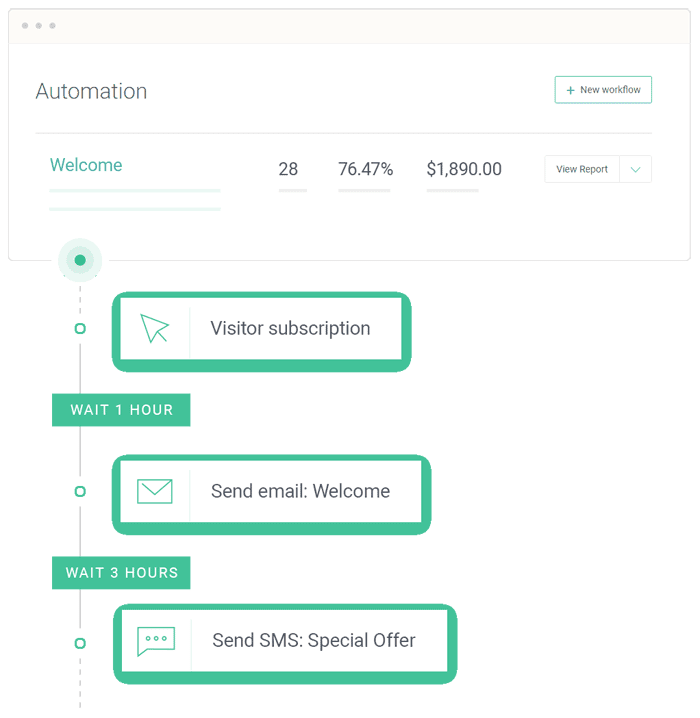
Omnisend count as a marketing automation service, too. It combines powerful email marketing capabilities with SMS and other channels. The key is in the name — it specializes in creating a slick digital marketing strategy that spans multiple channels all from one central dashboard.
Another aspect that sets the service apart from other marketing automation solutions is that features are specifically tailored towards ecommerce brands, helping them scale while maintaining and nurturing customer relationships.
You can integrate several different channels into your workflow, create branded emails from premade templates, and tap into automation tools that let you run campaigns on autopilot.
Price
There is a free plan for email marketing, but use of the automation tools starts at $16 per month for up to 500 contacts.
Further reading: Enterprise Marketing Automation Software: Tips & Tools
Get started with marketing automation software
Ready to reap the benefits of marketing automation? Here are a few factors to take into account when choosing your marketing automation tool:
- Your particular business needs: what features are essential for your team (e.g. CRM integrations, social media marketing)
- Your budget: what kind of plans does the marketing automation software offer and how much do they cost?
- Your team’s tech savviness: what is the marketing automation tool’s ease of use?
- The size of your contact list: how many contacts or email subscribers do you have?
- The channels you want to automate: do you just use an email marketing tool, or do you also need multichannel features (e.g. SMS, WhatsApp)?







